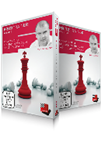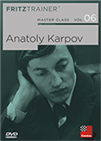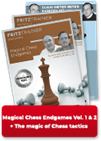The longest in history
Replay full analysis of the game by world number six Anish Giri at the end of the article!
 Back in 1978, world champion Anatoly Karpov played his first match to defend the title after getting the world crown by default in 1975. He faced Viktor Korchnoi, a fierce fighter, in Baguio City, Phillipines. The fifth game, played on July 27, followed a streak of four very short draws. The game also ended in a draw, but by no means was it a short one — it would become the longest-ever game (in terms of moves) in a World Championship match up to that point, and it held that record for over 43 years. Until the sixth game of the 2021 match between Magnus Carlsen and Ian Nepomniachtchi.
Back in 1978, world champion Anatoly Karpov played his first match to defend the title after getting the world crown by default in 1975. He faced Viktor Korchnoi, a fierce fighter, in Baguio City, Phillipines. The fifth game, played on July 27, followed a streak of four very short draws. The game also ended in a draw, but by no means was it a short one — it would become the longest-ever game (in terms of moves) in a World Championship match up to that point, and it held that record for over 43 years. Until the sixth game of the 2021 match between Magnus Carlsen and Ian Nepomniachtchi.
After 136 moves, not only did Carlsen and Nepomniachtchi break the aforementioned record, but the game also saw Carlsen obtaining the first win in a classical encounter at a World Championship match in a bit over five years — the Norwegian had defeated Sergey Karjakin with white in game 10 of the 2016 match on November 24.
It was a full-blown fight, which lasted 7 hours and 45 minutes. Since games kick off at 16:30 local time in Dubai, the first decisive encounter of this year’s match finished fifteen minutes past midnight!
 Let our authors show you how Carlsen tailored his openings to be able to outplay his opponents strategically in the middlegame or to obtain an enduring advantage into the endgame.
Let our authors show you how Carlsen tailored his openings to be able to outplay his opponents strategically in the middlegame or to obtain an enduring advantage into the endgame.A rollercoaster battle, the game saw Carlsen employing a non-forceful opening setup with the white pieces, apparently trying to take the struggle to the middlegame. Nepo responded in kind, as he rejected an opportunity to swap queens on move 17. Uncharacteristically, Carlsen found himself in deep time trouble, and a sharp skirmish saw him missing a major chance to play a winning sequence nearing the first time control. In the endgame, piece setups continued to shift, but Carlsen never stopped trying, and he was eventually rewarded with a remarkable victory.
As per the contract signed by the contenders, they were obliged to attend a press conference no matter the length of the game. Nepo was visibly downhearted, but also extremely polite when giving his responses, while a chirpy world champion reflected:
It was never easy, nor should it be. [...] You have to try for every chance, no matter how small it is.
Going to the press conference must have felt as only a small inconvenience for the players though. Especially for Nepo, it is rather unfortunate that this marathon took place in the first of a three-game series to be played on consecutive days. The players will return to the board on Saturday and Sunday, with the Russian getting one more black during the weekend.
Going for a middlegame
Perhaps avoiding either a Petroff or a Berlin, Carlsen played 1.d4, and after 1...Nf6 2.Nf3 d5 3.g3, delaying a pawn push to c4, the world champion asked the challenger what kind of setup he wanted to establish on the board. The sneaky move order avoided any forceful lines that might give White an advantage from the get go, but in exchange took the battle to the middlegame, where the Norwegian intended to demonstrate his superiority.
Nepo was more than up to the task, rejecting a pawn sacrifice on move 10 and going for activity instead. Moreover, on move 17 the Russian chose not to trade queens, expecting to get good play despite doubling his pawns on the kingside.
Instead of 17...Qxf6 18.Qxf6 gxf6, Nepo immediately went for 17...gxf6. In his annotations, Anish Giri explained:
An interesting choice, perhaps stemming from some ambition. Queen trade would have also been fine. Sometimes in those endgames White can claim a good d3 knight against a “bad” bishop, but with Black pieces so active and bishop being on b6, there is little talk of White fighting for anything.
With so much talk about draws in the World Championship match, this was a clear sign that it had little to do with the players’ willingness to fight. As Olimpiu G. Urcan put it:
 These DVDs are about Understanding Middlegame Strategies. In the first DVD dynamic decisions involving pawns are discussed. The second DVD deals with decision making process concerning practical play.
These DVDs are about Understanding Middlegame Strategies. In the first DVD dynamic decisions involving pawns are discussed. The second DVD deals with decision making process concerning practical play.
Black was doing fine, and Carlsen was burning quite a lot of time on each move. Nepo’s choice on move 25 only made matters more complicated.
Black could have played 25...b4, more or less keeping things under control, while with 25...Rac8 he agreed to enter an imbalanced position with a queen against a pair of rooks after 26.Qxc8 Rxc8 27.Rxc8. Giri:
This is not neccessary, but it did lead to chaos, so the fans should be grateful to Ian.

Chess is hard! | Photo: Eric Rosen
Time trouble
Unlike in previous World Championship matches, FIDE decided this year to only give the contenders an increment after move 61. Thus, in both time controls — on move 40 and move 60 — players are forced to make their moves with the clock ticking down incessantly, without getting a 30-second breather after each decision. For the first time in the match, this factor played a major role in game 6.
With Carlsen’s clock dangerously ticking down, the engines suddenly showed he had a +2 advantage after move 32!
Maurice Ashley asked Carlsen if he had analysed 33.Rcc2 in this position, with the world champion rather dumbfounded by the question. He went for 33.Rd1 instead, which is understandable given how low on time he was and how “hard to spot and calculate” the winning variation was (Giri).
The idea is that after 33.Rcc2 Bxa3 White has 34.Nf4, giving up a second pawn on the queenside — 34...Qxb4 35.Rd7 e5 36.Nxh5+ Kg6
 On this DVD a team of experts looks closely at the secrets of Karpov's games. In more than 7 hours of video, the authors examine four essential aspects of Karpov's superb play.
On this DVD a team of experts looks closely at the secrets of Karpov's games. In more than 7 hours of video, the authors examine four essential aspects of Karpov's superb play.
The surprising winning move here is 37.Rc6, since 37...Kxh5 leaves the black king in a mating net after 38.Rxf7. As Giri explains:
You have to see what your follow-up is here, otherwise the whole sequence makes little sense. [...] The move itself is not obvious, giving up both queenside pawns, but the attack is devastating.
In the game, Nepo was fortunate that his opponent did not see this line, but also missed some chances of his own in the time scramble — he did not have that much more time on his clock than Carlsen during this phase of the game.

Over 7 hours of deep focus | Photo: Niki Riga
The endgame
At the press conference, Mike Klein compared the game to a miniseries, implying the existence of episodes and turning points. We can take the comparison further and note that the endgame was in itself a miniseries, with sub-episodes and turning points of its own — we will surely get a more in-depth look to the intricacies of the ending by our in-house specialist Karsten Müller, perhaps in the next instalment of the ‘Endgame Magic’ show.
First, Black seemed to have enough counterplay with his passed pawn on the a-file.
Once that pawn left the board, it seemed like — as long as the black queen remained active — White would not be able to break through.
White then grabbed both f-pawns and the bishop in exchange for a rook. Nepo’s task was not enviable, but his previous play seemed to demonstrate he would be able to hold the balance.
 In over 4 hours in front of the camera, Karsten Müller presents to you sensations from the world of endgames - partly reaching far beyond standard techniques and rules of thumb - and rounds off with some cases of with own examples.
In over 4 hours in front of the camera, Karsten Müller presents to you sensations from the world of endgames - partly reaching far beyond standard techniques and rules of thumb - and rounds off with some cases of with own examples.
Finally, when White’s g-pawn and Black’s h-pawn left the board, we were in tablebases territory — the game was drawn with perfect play. However, well into the eighth hour of play and facing the ever-fighting world champion, it was never going to be easy for Nepo.
The losing move according to the tablebases was Black’s 130th! Six moves later, the Russian challenger threw in the towel.
It was nothing short of a fantastic chess game!
Expert analysis by GM Anish Giri

Up on the scoreboard — world champion Magnus Carlsen | Photo: Eric Rosen
All games
Links


















 Back in 1978, world champion Anatoly Karpov played his first match to defend the title after getting the world crown by default in 1975.
Back in 1978, world champion Anatoly Karpov played his first match to defend the title after getting the world crown by default in 1975. 




